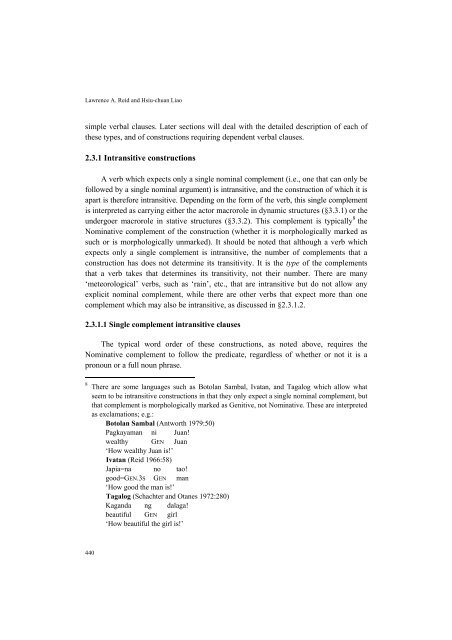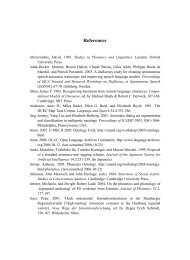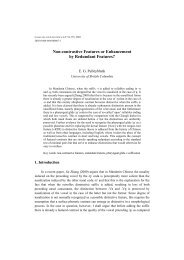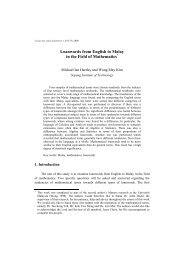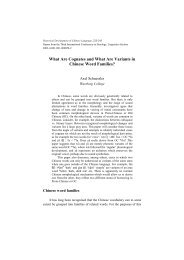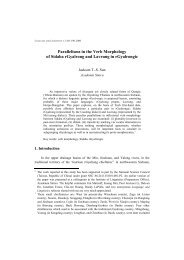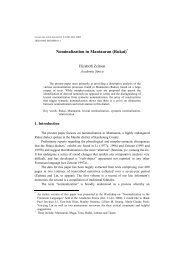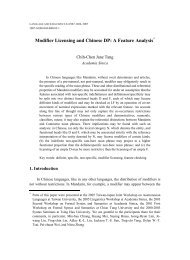A Brief Syntactic Typology of Philippine Languages - Academia Sinica
A Brief Syntactic Typology of Philippine Languages - Academia Sinica
A Brief Syntactic Typology of Philippine Languages - Academia Sinica
Create successful ePaper yourself
Turn your PDF publications into a flip-book with our unique Google optimized e-Paper software.
Lawrence A. Reid and Hsiu-chuan Liao<br />
simple verbal clauses. Later sections will deal with the detailed description <strong>of</strong> each <strong>of</strong><br />
these types, and <strong>of</strong> constructions requiring dependent verbal clauses.<br />
2.3.1 Intransitive constructions<br />
A verb which expects only a single nominal complement (i.e., one that can only be<br />
followed by a single nominal argument) is intransitive, and the construction <strong>of</strong> which it is<br />
apart is therefore intransitive. Depending on the form <strong>of</strong> the verb, this single complement<br />
is interpreted as carrying either the actor macrorole in dynamic structures (§3.3.1) or the<br />
undergoer macrorole in stative structures (§3.3.2). This complement is typically 8 the<br />
Nominative complement <strong>of</strong> the construction (whether it is morphologically marked as<br />
such or is morphologically unmarked). It should be noted that although a verb which<br />
expects only a single complement is intransitive, the number <strong>of</strong> complements that a<br />
construction has does not determine its transitivity. It is the type <strong>of</strong> the complements<br />
that a verb takes that determines its transitivity, not their number. There are many<br />
‘meteorological’ verbs, such as ‘rain’, etc., that are intransitive but do not allow any<br />
explicit nominal complement, while there are other verbs that expect more than one<br />
complement which may also be intransitive, as discussed in §2.3.1.2.<br />
2.3.1.1 Single complement intransitive clauses<br />
The typical word order <strong>of</strong> these constructions, as noted above, requires the<br />
Nominative complement to follow the predicate, regardless <strong>of</strong> whether or not it is a<br />
pronoun or a full noun phrase.<br />
8 There are some languages such as Botolan Sambal, Ivatan, and Tagalog which allow what<br />
seem to be intransitive constructions in that they only expect a single nominal complement, but<br />
that complement is morphologically marked as Genitive, not Nominative. These are interpreted<br />
as exclamations; e.g.:<br />
Botolan Sambal (Antworth 1979:50)<br />
Pagkayaman ni Juan!<br />
wealthy GEN Juan<br />
‘How wealthy Juan is!’<br />
Ivatan (Reid 1966:58)<br />
Japia=na no tao!<br />
good=GEN.3S GEN man<br />
‘How good the man is!’<br />
Tagalog (Schachter and Otanes 1972:280)<br />
Kaganda ng dalaga!<br />
beautiful GEN girl<br />
‘How beautiful the girl is!’<br />
440


